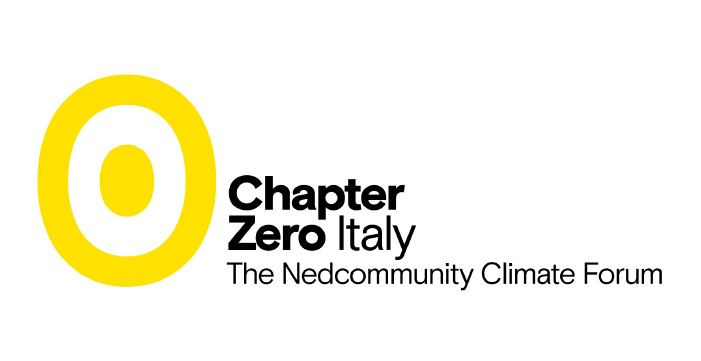
Host:
Chapter Zero Italy
Moderator:
Raffaele Rizzi, General Counsel & ESG Expert, Steering Committee Chapter Zero Italy
Panellists:
- Paola Schwizer, Full Professor in Financial Markets and Institutions at University of Parma and Affiliate Professor at SDA Bocconi School of Management; Board Member, Honorary Chair, Nedcommunity; Steering Committee, Chapter Zero Italy
- Alfredo Romano, Board Advisor, Associate FS UNEP Collaborating Centre for Climate Sustainable Energy Finance
- Benedetta Conticelli , MD Kryalos SGR & CEO Land of Fashion
- Kelly Russell, Head of Sustainability & Communication at COIMA
- Maria Buttiglieri, Consultant at Russell Reynolds
The real estate sector is responsible for 40% of energy consumption and 36% of carbon emissions, therefore, is able to play a key role in the mitigation of climate change towards net zero. The conference emphasized the delicate issue of ecological transition of one of the most important sectors for the economy in one in one of the most critical phases since the Second World War.
The session was introduced by Paola Schwizer, who wanted to point out how many companies in the sector are not still aware of the need for a transformation towards a carbon free economy, which in fact is happening too slowly. One of the main reasons is related to the fact that this transition not only requires large investments, but also, if not above all, it requires a great responsibility on the part of the protagonists, and the board of directors. Certainly, a role will have to be played by national and international decision-makers providing incentives to accelerate the transition to more sustainable buildings.
Alfredo Romano, Board Advisor, Associate FS UNEP Collaborating Centre for Climate Sustainable Energy Finance, shared the same perspective: “large investments are needed and must be planned well before 2030 to comply with the objectives defined in the Paris agreement”. Alfredo has identified four steps that cannot be ignored: accurate measurement of the current impact of the industry; identification of climate objectives; development of an adequate strategy; concrete creation of sustainable products, services and solutions. “All these initiatives have a financial impact; they can create or destroy value. But what role can governance play then? The sense of urgency for a real change has pushed the issue of transition up in the agendas of the board of companies of this sector. For this reason, directors are called upon to identify risks and opportunity and to guide this process. The challenge is not insignificant also because there is a lack of guidelines and reference points, including regulatory ones. The board of directors are therefore required to manage a new complexity and the only way to do it is by integrating climate change in the decision-making processes and in the adoption of a long-term vision”.
The event was also an opportunity to present a general overview of the main challenges that board in the real estate industry are facing in integrating ESG in corporate strategy as discussed during the round table, coordinated by Raffaele Rizzi. The panel included members of boards of private equity and headhunters who, among other things, have dealt with the issue of the behaviours that the directors must adopt and of the skills they must possess to accompany the sector in this delicate phase.
According to Benedetta Conticelli, MD of Kryalos SGR & CEO of Land of Fashion, “integration of ESG principles in the strategy of boards and companies in general becomes a priority because only in this way it will be possible to protect the value of the portfolio, strengthen reputation, manage risks, optimize investments related to this transition. For this reason, the characteristics that a board must have include: respect for diversity, independence of mindset, strong competence on issues of sustainability, transparency, effectiveness and efficiency of the action of governance.”
Kelly Russell, head of Sustainability & Communication at Coima, a leading group in the investment, development and management of real estate assets on behalf of investors institutional “the emergency is real; therefore, it should not be underestimated. On the other hand, this commitment to transition also represents a great opportunity. For that reason, Coima, is preparing by leveraging the expertise of sustainable innovation committee and a dedicated team”.
Finally, Maria Buttiglieri, consultant at Russell Reynolds, led with a question: “Can real estate companies, since they are perceived as ‘dirty investment’, continue to create capital?” The answer is certainly positive, as long as they are able to really intercept the opportunities and exploit them quickly: for this reason, the role of the board is central. The presence of sustainability committees, still too rare today in the boards of companies in this sector, must become the norm.
Ambition to Action: Key actions for boards
Board members need to ensure proper measurement of climate change impact and full risk assessment as the starting point for long term planning. If this is done properly, the valuation of the real estate portfolio will benefit. Private Equity players agree that creating a Sustainability Committee within the Board, including climate change competences, is an essential element to drive decision making in the industry and create value.
The presentations used during the webinar are available below, courtesy of Chapter Zero Italy:
This session summary was provided by the hosts.